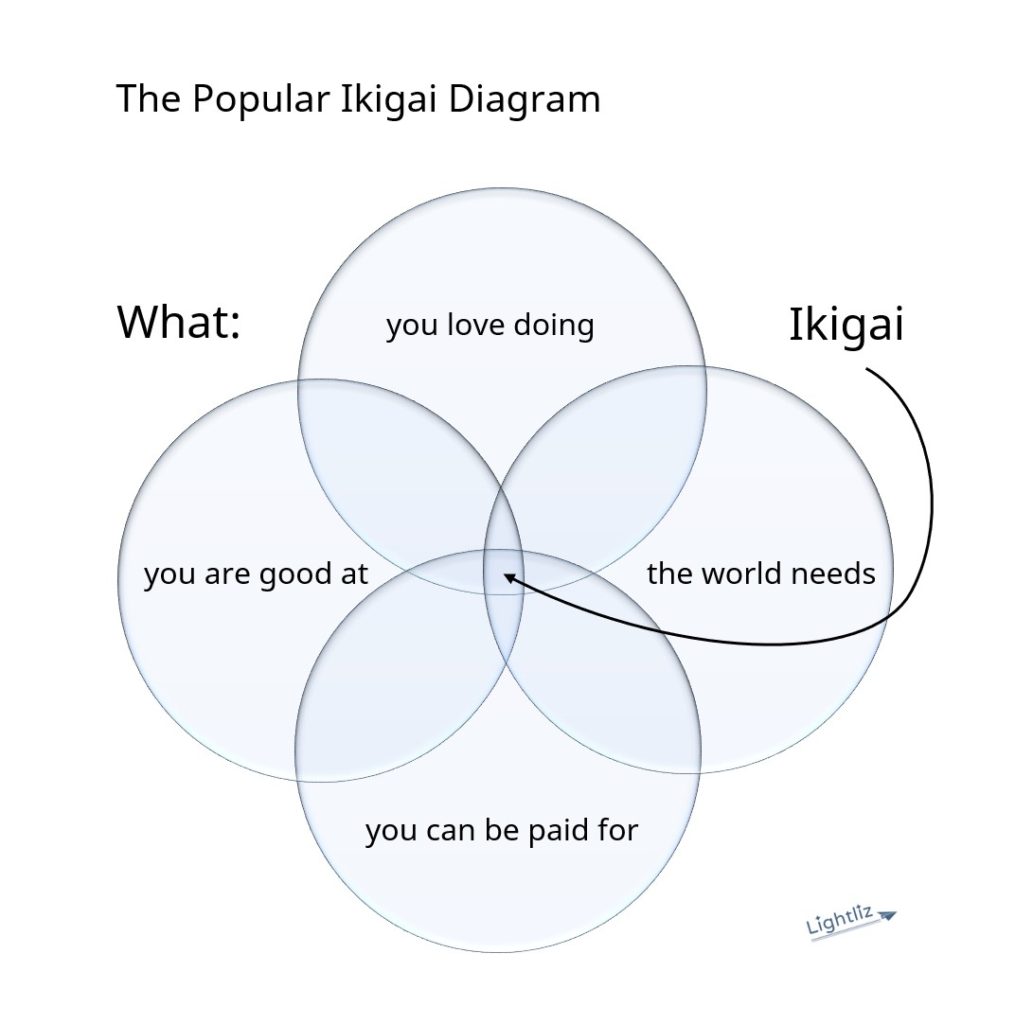Waking up every day to do something you love, enjoy, and pay the bills: That’s living the dream, right? What if I told you it’s possible for you with ikigai? But, what is ikigai, you ask?
Keep reading, to learn how to find your ikigai.
Do you know why you are here? Many of us struggle with our day-to-day life, not because it’s difficult, but because we’re simply existing. We go through life and its activities on autopilot because that’s what we find people doing.
It may work for some time, but work will be draining pretty soon, and that’s not an ideal place to be for a prolonged period. Your feelings won’t make sense to everyone because most people will tell you to be grateful for a source of income.
Disclaimer : The information provided in this site is for educational purposes only, and it is not a substitue for professional advice. The article may contain affiliate links. See the full disclaimer for more details.
There’s More To Life Than Making Money
We know that life isn’t just about the money you make. Finding fulfillment in what you do makes all the difference. According to a McKinsey study, 85% of the executives and upper management said they live their purpose in their day-to-day work. Only 15% of frontline employees and managers agreed to find purpose in their work.
This study shows that compared to other employees, executives are eight times more likely to say that work fulfills their purpose.
What does this tell us? Most people work just to foot the bills, but not because it defines their purpose. But once you know how to find your Ikigai, you’ll find a meaningful purpose at work.
Why? Because finding your ikigai is finding your life purpose.
Ikigai (ee-key-guy) refers to a Japanese word that roughly translates to ‘reason for being’ or, as the French would say, ‘raison d’etre.’
It stems from Japanese words. The first one is iki, which means ‘life’ or ‘alive,’ and kai which means ‘result,’ ‘benefit,’ or ‘worth’ in this context. It has other meanings depending on how it is written. Kai is voiced as gai hence ikigai.
Purpose, Happiness and Wellbeing
The concept of ikigai is complex and encompasses having a valuable existence based on a particular source. It affirms that emotional and mental health and purpose affect physical well-being.

In this mind-body flow illustration, we can see the interrelation between three components: The sense of purpose we have (or don’t have) can affect our emotional state and our overall wellbeing. This is why it’s so important to have a sense of purpose in life. According to A 20-year wellbeing study in Australia, the sense of purpose is one of the key domains of our wellbeing.
Take me as an example. When I lost my sense of meaning and joy in life I started to develop various physical symptoms like back pain, shoulder pain, and heartburn. In the same manner, when I reinvented myself as a content creator I felt much better mentally and physically. Of course, this is only my case. Different people will face different issues during their life course, but we can agree that it is better to have a sense of purpose in your life.
By sense of purpose I mean not just fleeting happiness. It is a sense of fulfillment derived from carrying out activities you enjoy. You, essentially, wake up to joy every morning because you took the path that suits you best.
There’s a kind of flow in your daily life that yields your best moments. Flow occurs when you consistently do something you are good at and enjoy, coupled with the prospect of adding value to other people too. Ikigai is not just a personal pursuit of happiness but benefits others.
What to Consider When Looking for Your True Purpose
Everybody is called to a different career path, but it may take some time to figure out. It becomes more challenging to identify because we spend our lives taking instructions from other people, doing what they want us to do instead of doing what is suitable for us.
Sometimes you don’t even know what you want to do because you haven’t given yourself room to explore that direction.
If the path you’re on isn’t for you, you find yourself trying to fill the void with different things. Some resort to physical pleasures, things that will numb their senses, or making as much money as possible so they feel powerful and in control somehow. It’s not uncommon to see a combination of all these, especially in societies that consider themselves modern or urban.
Do It Your Way
Contrary to what the fast-paced 21st century portrays, there’s no rush. There’s no predetermined schedule either.
Going through life at your own pace and looking at it through your own eyes will give you a better perspective. Your future depends on you living truthfully and living out your potential.
So, what do you need to find your ikigai? How do you get to your life’s purpose?
Four Core Questions to Answer
According to the popular, western interpretation of ikigai there are four crucial aspects you need to ask yourself:
- What you love doing
- What you are good at
- What someone can pay you for
- What the world needs that you can offer.
Where these four intersect is your ikigai.
Think of a Venn diagram with four circles that intersect. Each circle represents the four areas mentioned above. Finding your ikigai would entail purposefully filling those circles and assessing where they overlap and meet.

Seems simple, doesn’t it? Straightforward, maybe. But simple? Probably not. Some circles may be easy to fill, but others require deep thought. Don’t shy away from work, though.
Doing this exercise will help you straighten out your life and set you on the path to joy and fulfillment, elusive as it has been.
Let’s take a deeper dive into these four categories.
1. What Do You Love Doing?
Think about the things that bring you joy. Maybe it’s writing or performing poetry, singing in a jazz band, rock climbing, hiking, or simply throwing parties and spending time with your friends. Or is it sailing?
It doesn’t matter whether you do it well or not or whether you earn from it. What matters is the feeling it evokes when you do it.
Look at things you do and have brought you immense joy since childhood. Why childhood, you ask? Children do things because they enjoy them and not because they need to. They just flow naturally and give their all in their activities.
Watch a group of children passionately engaged in play, and you’ll get the idea. They fully commit to it, complete with minute crockery and snacks for a tea party or costumes and appropriate lingo when playing house.
Doing something you love ensures you can naturally and effortlessly do it repeatedly and keep at it even when things get tricky. And they will. Regardless of the circumstances, this activity always calls out to you and draws you in.
In other words, your passion. You’ll find that your passion lies where what you love and what you’re good at intersect.
2. What Are You Good At?
The answer to this question points to your vocation. It could be hobbies you do well and have probably pursued, skills you learned along the way, or something you’ve done since childhood.
Examples include playing an instrument, being empathic, being a good listener, public speaking, playing a particular sport, or conducting facial reconstruction surgery. Yes, the list varies widely!
What matters the most in this category is that you do it very well. Your vocation lies where what you can get paid for and what the world needs to intersect.
3. What Can Someone Pay You For?
Now we go to your profession. Is there something you can do that someone would gladly pay you for?
It may be one of your passions or talents as long as it’s economically viable. The intersection between what you can get paid for and what you are good at is your profession.
4. What Does Society Need That You Can Offer?
This question leads you to your mission. Society here means community. It could be a small community you interact with regularly. Everyone has their calling.
The need could be something you’ve observed or something those affected have outrightly expressed. It could range from clean water to reduced maternal mortality to volunteers for a regularly occurring event.
This one is not about you. It’s about doing good for others based on their needs. Your mission lies at the intersection between what the world needs and what you love.
Francesc Miralles, author of the international best-seller Ikigai: The Japanese Secret to a Long and Happy Life, says that you don’t necessarily have to have the same ikigai throughout your life. Your purpose may change as you go through different seasons. It’s also possible that you have more than one passion.
You may be an accountant with a love for fishing or a chef passionate about helping young mothers navigate their first years of motherhood. It’s even possible you didn’t know what you wanted to do until much later. There’s nothing wrong with being a late bloomer!
The Spanish author first wanted to travel the world, working hard to fulfill it. Later he wanted to teach, and afterward, he wanted to publish psychology works. Talk about reinventing yourself!
The above description is the basic understanding of Ikigai, but as we’ll see now, it goes beyond this.
The Original Meaning Of Ikigai
While the western interpretation of ikigai can be useful, it does not represent the original meaning of the concept. According to ikigai experts on ikigaitribe.com the popular Venn diagram doesn’t quite do it justice. By the Japanese culture, ikigai is a spiritual and mental everyday state under which you feel valuable in life.
Ikigai isn’t this unattainable lofty goal. It’s about enjoying the present and embracing the joy that comes from the little things, reflecting on past happy memories, and keeping a positive mindset that allows you to believe you can create a happy, wholesome, and active life.
The figure below summarizes the actual Ikigai components:
The figure‘s source: Professor Akihiro Hasegawa of Toyo Eiwa University.
Experts from ikigaitribe suggest that the traditional Japanese meaning of ikigai is less about the following:
1. It’s Not Exactly About Money or What the World Needs from You
You may undoubtedly achieve financial and professional success when you find your ikigai, but this isn’t the core focus. Accumulating wealth isn’t what you are after, but it should undoubtedly be embraced if it comes as a reward.
Those bills won’t pay themselves! But remember that life is still worth living regardless of what your bank account looks like.
Your world is the community around you, not the universe as a whole. Ikigai is about your world, your community, the people you interact with the most. Think of your family, friends, neighbors, your church, or spiritual community.
The roles you take up in the lives of those who have the most impact on your own life and bring meaning to it are more critical. Don’t think that if you’re not saving the world, then it can’t count as ikigai.
Seek to connect with those closest to you instead.
This also doesn’t mean that you shouldn’t use your money to help causes outside your neighborhood. Use your discretion and do what feels right, hopefully not at the expense of those around you.
2. It’s Not Only About What You’re Good At or What You Love
You don’t always have to consider the thing you are perfect at to find your ikigai. It may lie in the miniature hobby or daily ritual you devote time to. Growing in a particular area is more important than mastery. Progress over perfection is the goal.
You’ll be surprised to find your ikigai in something you didn’t expect because you aren’t passionate about it. More than anything, ikigai is about living out what you believe in and stand for and finding meaning in daily life despite any hurdles you may encounter.
So experiment and see what comes out of it!
How to Find Your Ikigai
Now you know what ikigai is, but what do you do with the list of things you’ve written down? Do you just go ahead and start doing what’s on the list?
Here’s a little guide with four things to help you figure out how to find your ikigai.
1. Determine Your Anchor
Only a strong anchor will withstand the fiercest storm. Look back at your life. Throughout every season you’ve encountered, what have you always gravitated to? What is that one thing you never get bored or tired of doing?
It brings them fulfillment and fills their day with joy for some people. It doesn’t have to be easy, but it’s something that makes you happy regardless of any difficulties you encounter.
2. Try Different Things
The world is set up in such a way that makes people think they should find one thing to focus on and ignore the rest. While there’s logic in this approach, many people have more than one interest and skill.
Instead of limiting yourself to only one area, why not try to widen your scope? You never know how much fulfillment your other skills will bring you!
Pick an activity and try it several times. Assess how it makes you feel and whether it adds value to your life or someone else’s. Would you like to do it more often? If your answer is yes, go ahead and do it! If not, move on to the next thing.
At the pandemic’s start, many people had to work from home. Do you know what they needed for this? Several skills!
Case in point: Someone creating videos in which they speak to their audience required public speaking skills, creativity to come up with regular appealing and relevant content, video recording skills, video editing skills, and knowing how to use the different software to upload or publish the content.
The end product is a single item, but the work that goes into it requires several skills put together. To successfully post videos, they had to learn and use different skills. A perfect definition of a jack of all trades, don’t you think?
There’s no harm in learning different things!
3. Connect With Kindred Spirits
Nobody is as helpful as someone who understands your interests and journey. They will encourage you and point you in the right direction where you need it.
If you love playing football, hang around a football field and see if you can join a game. Make friends with the other players and fellow spectators. You never know who they are or what opportunities they have access to!
Hone your skills and find your identity. When an opportunity to take your skills to the next level presents itself, you’ll be ready to snap it up.
On the flip side, there will be naysayers. Some people will try to dissuade you from pursuing your passion for different reasons. Some may think it’s a waste of time, and others may advise you to focus all your efforts on economically viable things.
But how badly do you want this? What does it mean to you? Answer these two questions and decide whether you will entertain detractors or smile and walk away.
4. Give Yourself Room for Mistakes
Life is not linear. You’ll make mistakes and experience delays. There’s nothing wrong with making mistakes or failing. What’s more important is learning from those mistakes. It’s also essential to unlearn and relearn things you may have picked up or lost along the way.
Sounds difficult to do? Remember when you were learning how to ride a bicycle or even fry an egg. Did you give up when you fell off the bike or burned the egg? No. You tried to figure out what you did wrong and tried again until you mastered it.
The principle is the same. Use your failures as stepping stones to your goal. Learn from other people’s mistakes too. It’ll save you a lot of time and possibly heartache.
Is It Worth the Trouble?
At first, finding your ikigai may seem overwhelming. What if you miss the mark? What if you choose wrong? What if you don’t know yourself well enough to choose right?
Consider this a journey of self-realization. You get to discover new things about yourself, uncover truths you never knew, and reaffirm some things you’ve always known about yourself. What’s there to lose?

There’s no time limit when you can figure out your ikigai. And even when you do, it doesn’t mean that’s the end of it. People grow, and interests change. Other things have probably replaced some of the things that once got you excited over time, and it’s only normal and natural.
It’s Self-love
There will be another and another as you go through different stages. You will continue to experience new dimensions of yourself as long as you are keen on it. It doesn’t matter when you do it, but how.
It’s a journey so personal that nobody can copy off another’s work. It eventually reflects on the outside when someone puts in the required effort.
How Does It Feel?
So you want to know what it’s like to find your ikigai? You will feel a strong sense of existence and control. Self-realization and a willingness to explore further and learn are also significant parts.
The sun seems brighter, birds chirpier, and you will feel motivated to live, not just wade through your waking hours. The best part is that ikigai leaves you feeling fulfilled with everyday life. You’re content in the here and now.
Isn’t this a great place to be?
Ikigai Test And Worksheet
To start your self-discovery journey take a 10 minutes free ikigai test (using the popular Venn diagram), or try this free ikigai worksheet with exercises and questions to find your ikigai (guided by the original Japanese concept).
You can also check different tools and techniques to define your purpose further.
Shachar is a blogger and sensitive person who worked in a recruitment company and holds a master’s degree in sociology. After years of struggles to find purpose, he made this blog to help others find their purpose more efficiently. He likes to play chess, walk in nature, and take photos in his free time.


